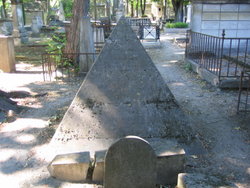- Constantin-François Chassebœuf
-
Constantin François de Chassebœuf, comte de Volney (3 February 1757 – 25 April 1820) was a French philosopher, historian, orientalist, and politician. He was at first surnamed Boisgirais after his father's estate, but afterwards assumed the name of Volney (which he had created as a contraction of Voltaire and Ferney).
Contents
Life
Revolution
He was born at Craon, Anjou (today in Mayenne) of a noble family. Initially interested in Law and Medicine, he went on to study Classical languages, and his Mémoire sur la Chronologie d’Hérodote (on Herodotus) rose to the attention of the Académie des Inscriptions and of the group around Claude Adrien Helvétius. Soon after, Volney befriended Pierre Jean George Cabanis, the Marquis de Condorcet, the Baron d'Holbach, and Benjamin Franklin.
He embarked on his journey to the East in late 1782 and reached Ottoman Egypt were he spent nearly seven months. Thereafter, he lived for nearly two years in Greater Syria in what is today Lebanon and Israel/Palestine in order to learn Arabic. He returned to France in 1785 where he spent the following two years compiling his notes and writing his Voyage en Egypte et en Syrie, which was published in 1787, and Considérations sur la guerre des Turcs et de la Russie in 1788.
He was a member both of the Estates-General and of the National Constituent Assembly after the outbreak of the French Revolution. In 1791 appeared Les Ruines, ou méditations sur les révolutions des empires, an essay on the philosophy of history, containing a vision which predicts the final union of all religions by the recognition of the common truth underlying them all.
Volney was one of the earliest writers to question the historicity of Jesus.[1] Volney tried to put his politico-economic theories into practice in Corsica, where in 1792 he bought an estate and made an attempt to cultivate colonial produce. Chassebœuf de Volney was thrown into prison during the Jacobin Club triumph, but escaped the guillotine; he was some time professor of history at the newly founded École Normale.
Later life
In 1795 he undertook a journey to the United States, where he was accused (1797) by John Adams' administration of being a French spy sent to prepare for the reoccupation of Louisiana by France. Consequently, he was forced to return to France in 1798. The results of his travels took form in his Tableau du climat et du sol des Etats-Unis (1803).
He was not a partisan of Napoleon Bonaparte, but, being a moderate Liberal, was impressed into service by the First French Empire, and Napoleon made him a count and put him into the senate. After the Bourbon Restoration he was made a Peer of France, upon recognition of his hostility towards the Empire. Chassebœuf became a member of the Académie française in 1795. In his later years he helped to found oriental studies in France, learning Sanskrit from the British linguist Alexander Hamilton, who he had helped to protect during the Napoleonic era.
He died in Paris and was buried at the Père Lachaise.
Cultural offices Preceded by
Claude-François Lysarde de RadonvilliersSeat 24
Académie française
1803–1820Succeeded by
Claude-Emmanuel de PastoretReferences
- ^ Constantin-François Volney, Les ruines, ou Méditations sur les révolutions des empires (Paris: Desenne, 1791); English translation, The Ruins, or a Survey of the Revolutions of Empires (New York: Davis, 1796).
External links
- Works by Constantin-François de Chassebœuf, Comte de Volney at Project Gutenberg
 Chisholm, Hugh, ed (1911). "Volney, Constantin François Chassebœuf, Comte de". Encyclopædia Britannica (11th ed.). Cambridge University Press.
Chisholm, Hugh, ed (1911). "Volney, Constantin François Chassebœuf, Comte de". Encyclopædia Britannica (11th ed.). Cambridge University Press.- Travels Through Syria and Egypt, in the Years 1783, 1784, and 1785: Bccontaining the Present Natural and Political State of Those Countries, Their Productions, Arts, Manufactures, and Commerce : with Observations on the Manners, Customs, and Government of the Turks and Arabs : Illustrated VOL II out of II.
See also
- Volney prize
- Les Neuf Sœurs
- Society of the Friends of Truth
Categories:- 1757 births
- 1820 deaths
- People from Mayenne
- Counts of the First French Empire
- French ethnologists
- French historians
- French philosophers
- French travel writers
- Members of the Académie française
- People of the French Revolution
- Christ myth
Wikimedia Foundation. 2010.

